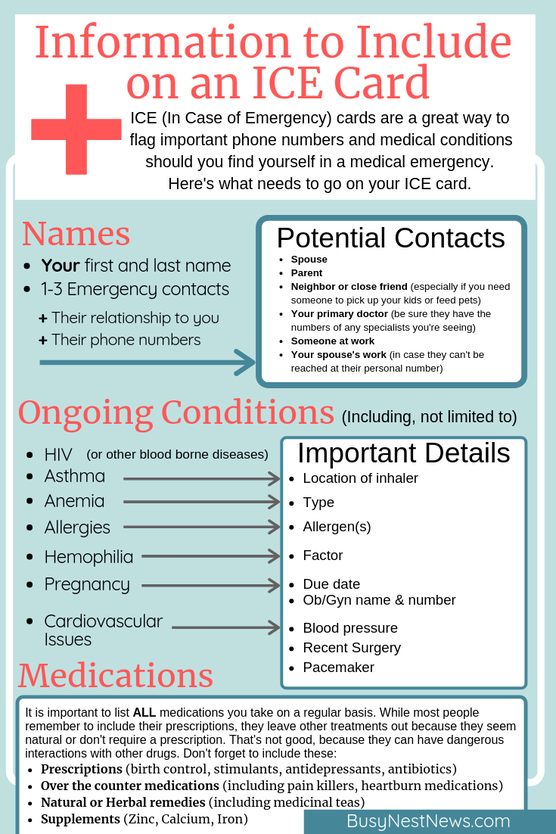|
by Brianna Get Ready!Here at Busy Nest News, we try to be ready for anything. We're always thinking about contingencies and emergencies. Not in a stressed out, paranoid way (most of the time), but in a "challenge accepted!" kind of way. When disaster strikes, we want to win. That sounds a little nuts, but we've seen too many disasters (small and large) to let ourselves off the hook. This month, we're going to share some of our favorite ways to always be prepared. In Case of Emergency (ICE)When I was pregnant with Monkey, I traveled home to New York for my baby shower. This involved taking a couple of flights each way in some pretty bad winter weather. To make things even more complicated, my husband was deployed, which meant that any emergency medical issues I might experience would have to be conveyed to him (and a number of other people) through very specific channels. Knowing that few people would know which calls to make on my behalf should I require emergency care, I prepared for this trip home by making a small emergency contact card. I stashed copies of it in my carry-on, my purse, my wallet, my coat pocket, my pants pocket, and anywhere else I could think of that someone might check. Here’s the thing, though, we should all have one of these on us. Whether you’re pregnant or not, traveling or staying home, you should have at least some emergency contacts on your person, especially when you’re alone. Runners have been known to buy engraved dog tags from pet supply stores to wear when they run by themselves. In fact a whole industry is developing to give runners and other active people more options to keep their emergency contact info on their person in a comfortable and attractive way. If you’re not ready to commit to your own set of dog tags just yet, consider using a simple pocket-sized form, like I did. To get you started, here is a list of three things that should be included on your card.
Names This section is pretty straightforward. Your name should be on the card. You should also include the names and numbers of a few key people. Some good options are your spouse, parents, someone at work, a friend or neighbor who can collect your kids (or feed the dog), and your doctor. Pick two or three of these, and keep a more extensive list of important numbers with them. This list should just be limited to what the EMTs or hospital care team need to know when you come to them. Ongoing Conditions If you have an ongoing or chronic medical condition you should invest in a medical alert bracelet. You can have the medical condition engraved on one side and “see wallet card” engraved on the other side. This makes it even more likely that emergency responders will look for your card, because they like to have important information but probably don’t have the time to search all of your pockets and accompanying bags. If your condition is accompanied by medical accessories or medication that is crucial to your care, indicate on your tag or card where to find these. Examples would be an epinephrine pen or inhaler. Medications Here’s the part where I get on my soapbox for a minute about listing medications. If you make a medication list, do try to make sure it is complete. By that I mean include EVERYTHING that you put on or in your body for remotely medical reasons. If you take heartburn medication or painkillers regularly, write that down! If you take zinc and calcium every time you feel the sniffles coming on, write that down! Those extra metals in your body can interact with other prescriptions, making them less effective (which might result in an emergency). Ditto natural remedies. These remedies work (to the extent that they do) because they are having some sort of chemical effect in your body. In the event of an emergency more substances might be introduced into your body that can cause negative interactions or be less effective when they encounter your zinc or St. John’s Wort. So if you really don’t have time to go over every possible interaction with a pharmacist, at least write down your typical regimen of natural or OTC remedies. Having an ICE card or section in your phone won't stop bad things from happening to you, but it can help make a bad situation slightly better. Whether it prevents a dangerous drug interaction or just gets your mom holding your hand one day sooner, it's worth it to take twenty minutes and get this crucial information in one place. How do you record emergency info? Do you carry an ICE card, or have ICE contacts in your phone? Are you an EMT and I left off something important? Comment below or email us; we want to know! Stay in Touch
0 Comments
Leave a Reply. |
AuthorsAriel and Brianna are friends who met while working in a library. Now they collaborate to develop life-enhancing book club experiences. Archives
June 2023
Let's keep in touch!Categories
All
|









 RSS Feed
RSS Feed